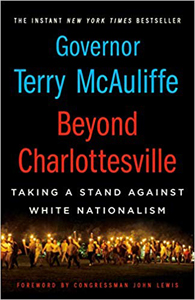 Terry McAuliffe, Beyond Charlottesville: Taking a Stand Against White Nationalism (New York: Thomas Dunne Books, 2019), 192pp.
Terry McAuliffe, Beyond Charlottesville: Taking a Stand Against White Nationalism (New York: Thomas Dunne Books, 2019), 192pp.
A review by Beth Thomsen Kawasaki. Beth is a graduate of Seattle Pacific University and Fuller Theological Seminary. She lives and works in California.
I read this book four days after a mass shooting in Gilroy, California, an agricultural community near my home. By the time I attended a book signing with former Governor Terry McAuliffe seven days later, there had been two more mass shootings — in El Paso, Texas, and Dayton, Ohio. Three shooters, in eight days, had murdered thirty-four people and injured sixty-four more. Two of these shooters had posted white supremacist content on social media.
On August 11–12, 2017, almost exactly two years ago, thirty-five people were injured, and Heather Heyer was killed, when self-professed neo-Nazi James Alex Fields, Jr. plowed them down with his car, in Charlottesville, Virginia. The weekend also claimed the lives of McAuliffe’s friend and pilot, Lt. Jay Cullen, and Trooper-Pilot Berke Bates, who were providing video feed of events from a helicopter when it crashed for unknown reasons.
Thus, a caveat: I didn’t read this book from a detached distance. I read it with my blood boiling, in one sitting.
McAuliffe is an ambitious politician who loves politics and believes in public service. This is evident in his writing, his CV, and in person. His best-selling 2006 book, What a Party! : My Life among Democrats - Presidents, Candidates, Donors, Activists, Alligators and Other Wild Animals, written when he served as Chair of the Democratic National Committee, is a rambunctious and inspiring call to take risks and engage in civic life.
In Beyond Charlottesville, McAuliffe writes that he is a Virginian “by choice” (he was born and raised in Syracuse), and, ever the statesman, he begins his book by sharing some of his accomplishments. He outmaneuvered the state’s Supreme Court to restore full voting rights to 206,000 convicted felons who had done their time and completed probation. In 2014, the threshold for a crime to be considered a felony was $200. A bad check for $201 could lose your voting rights for life. Understanding Virginia state nuances, why ideas and laws are perpetuated, and who is penalized by them, is a key strength of his new book.
In most of the book, McAuliffe details what happened, on a state and local level, before and during the fateful events in Charlottesville. The city’s decision to remove the statue of Robert E. Lee had galvanized over 1,000 White Nationalists, supremacists, and neo-Nazis from 35 states, to participate in a “Unite the Right” rally. Leaders of the rally had encouraged attendees to arrive equipped with intimidating torches, posters, flags, shields, and guns. They shouted anti-Jew/Muslim/Immigrant/Black/LGBTQIA/Women chants.
McAuliffe’s account is written from a state level and a governor’s perspective. He has received mixed reviews from some survivors and locals who were charged with making things go right that day, and who dispute where to lay the blame for what went wrong. Others complain that he portrays himself as a white savior. But even the dissenters rally around the pressing need to dig deep, learn from Charlottesville, and then share their wisdom, because during this era, we need to be prepared for more.
Beginning on the first page, McAuliffe laments how President Trump, whom he’d known earlier as a Democrat, golfer, and wealthy mover-and-shaker, failed to respond to the victims and the nation in a definitive and presidential manner during his press conference on August 12. He recalls the morning phone call during which he felt certain that the President would rise to the occasion and act immediately and clearly, but hours later he was shocked to hear, “We condemn in the strongest possible terms this egregious display of hatred, bigotry, and violence. . . on many sides, on many sides.” Trump later spoke of “blame on both sides,” and “very fine people on both sides,” in response to reporters.
Trump’s ambiguous, “many sides” approach is what provoked McAuliffe onto the national stage, where he displayed a different brand of leadership through his own words, in a speech that legendary Congressman John Lewis calls in the foreword “one of the great speeches I’ve heard in my life.”


